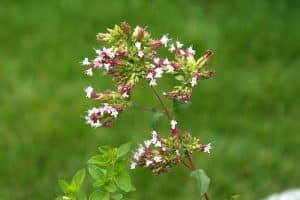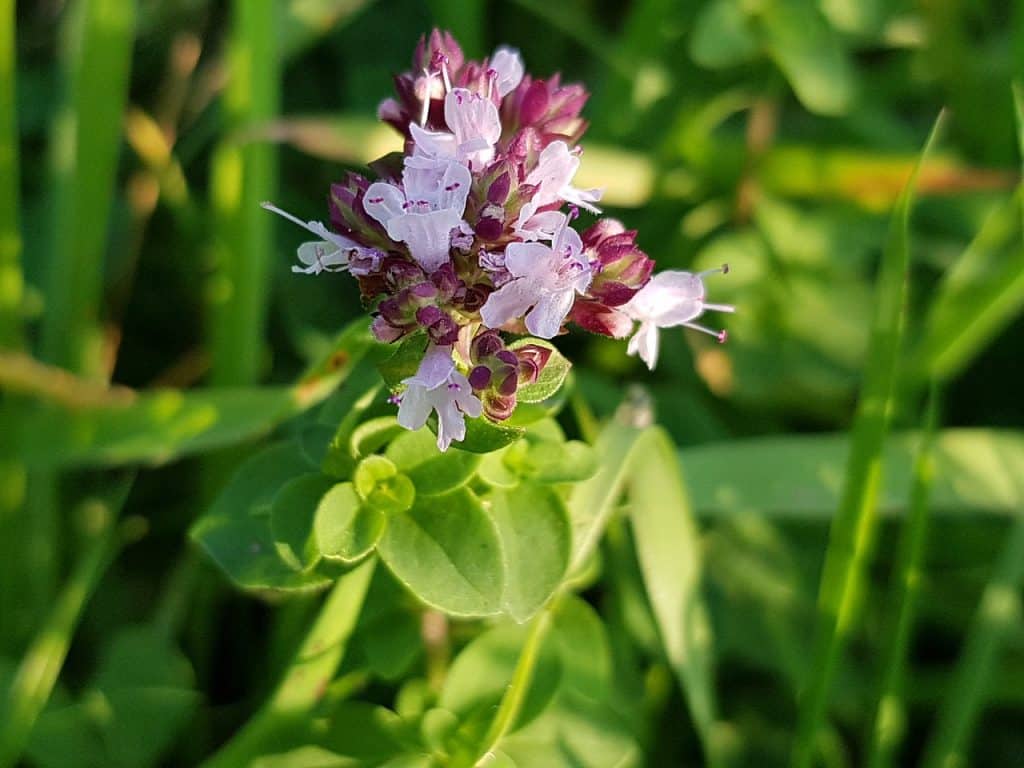Oregano –
Origanum vulgare L.
Residence in Bulgaria:
In our country it is found in grassy places and bushes, in stony areas, forest clearings and rare forests, throughout the country up to 2000 m above sea level. height
Description:
A perennial herb with a creeping rhizome from which new stems develop. The stems are tough, up to 60 cm long, erect, four-edged, mostly branched at the top

you are a part Leaves opposite, oblong, with slightly pubescent short petioles, to ovate-oblong, 2–4 cm long and 0.8–2.5 cm wide, usually entire or obscurely toothed, apex acuminate with hairs and sessile жлези. Цветовете са събрани в пазвите на едри, керемидообразни, припокриващи се виолетови прицветници така, че образуват класчета, разположени като метлица. Чашката е звънчеста, с 5 еднакви зъбеца и с пръстен от власинки при отвора. Венчето е неясно двууст- но с врязана горна и 3-делна долна устна. Тичинките са 4. Прицветниците са обагрени в лилаво, рядко в зелено, и са по-дълги от чашката. Плодът е съставен от 4 овални, гладки, тъмнокафяви орехчета.
Usable parts:
The flowering and leafy parts of the plant. When picking with a sharp knife, the upper flowering parts of the plant are cut off - up to 20 cm from the top.
It must be carefully harvested, not plucked with the rhizome!
Collection time:
June-August
Composition of the herb:
Contains up to 1.2 % essential oil, which includes thymol and cavracol, sesquiterpenes, gerenyl acetate, etc. The drug also contains tanning substances, flavonoids - derivatives of luteolin, diosmetin and apigenin
Therapeutic effect:
Антисептично, противовъзпалително, отхрачващо и нервноуспокоително. Стимулира секрецията на потните, храносмилателните и бронхиалните жлези. Има изразено сънотворно действие. Потиска половата възбуда.
Usage:
At inflammation и болки в стомаха и коремната област, чернодробни и жлъчни болести, запек, Indigestion. Diabetes. In acute and chronic bronchitis, трахеит, грип, магарешка cough, earache, whooping cough. With painful menstruation, nervousness, excitement, insomnia and others. The anthelmintic effect of the herb has been established. It is used for eczema, especially for small children, in the form of baths. Also for wounds, lichens and rashes
Ways of use:
Internally: 3–4 tablespoons finely chopped oregano pour 650 ml of boiling water, let it soak until it cools, then strain and drink 2-3 times a day, 200 ml each. It can also be used in the form of a tincture of 70 % alcohol and 20 % herb, taking 20 drops in 50 ml of water, 3 times a day. The oil extract from the herb is also successfully used: 2–3 drops, 2–3 times a day.
Externally: For baths: 20–40 g of finely chopped drug is poured with 1 liter of boiling water, after cooling, the infusion is added to the bath water.
Bulgarian traditional usage:
Oregano, which has been known and used since ancient times, from the time of the Thracians. The plant is harvested during flowering and is used by our people throughout the year. The decoction of oregano used for: diarrhea, dysentery, heartache, diseases of the liver and bile, cough, flatulence, to purify the blood. The boiled herb is prescribed for heartache, sore throat, toothache, wounds and eczema. The oil extracted from the herb, obtained by boiling the leaves, is also used.

